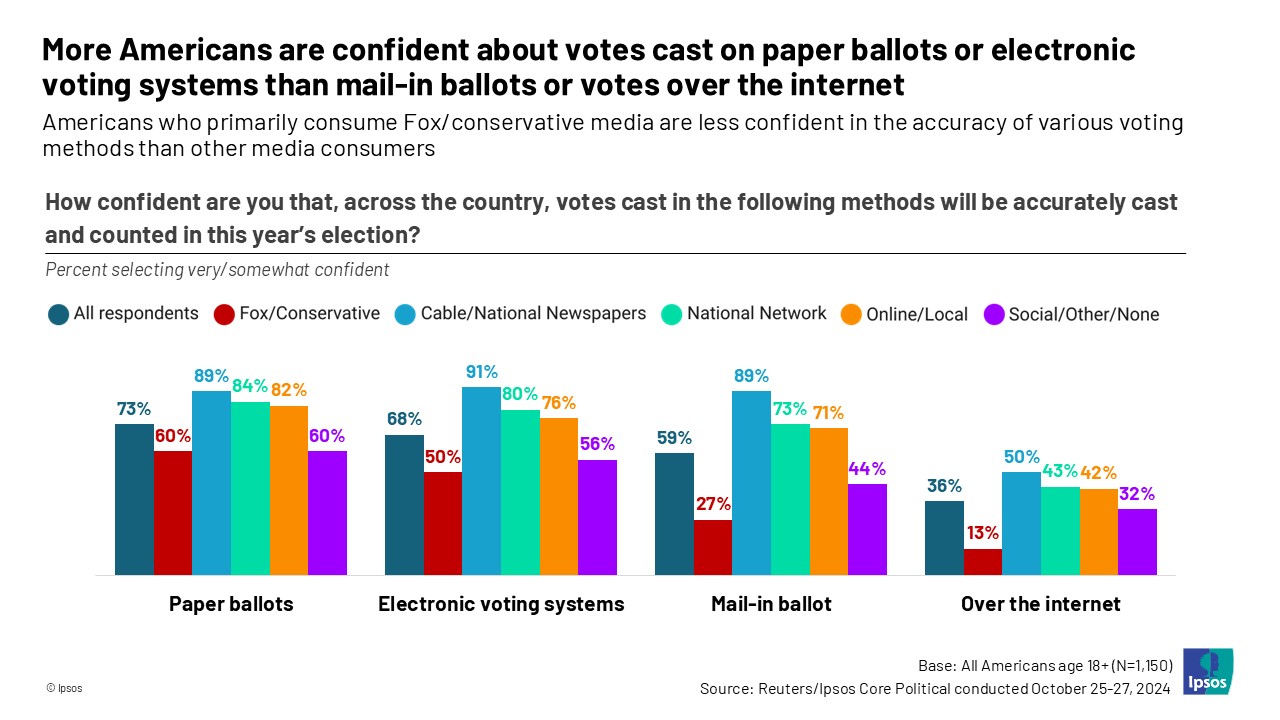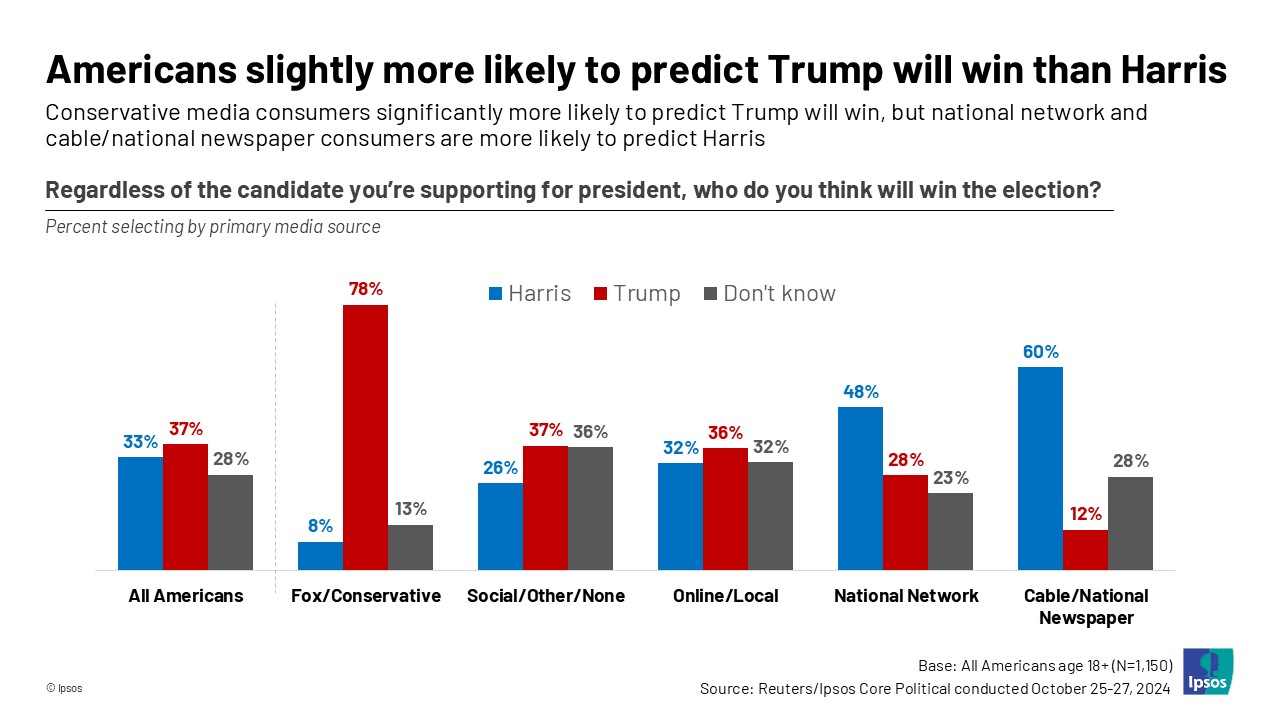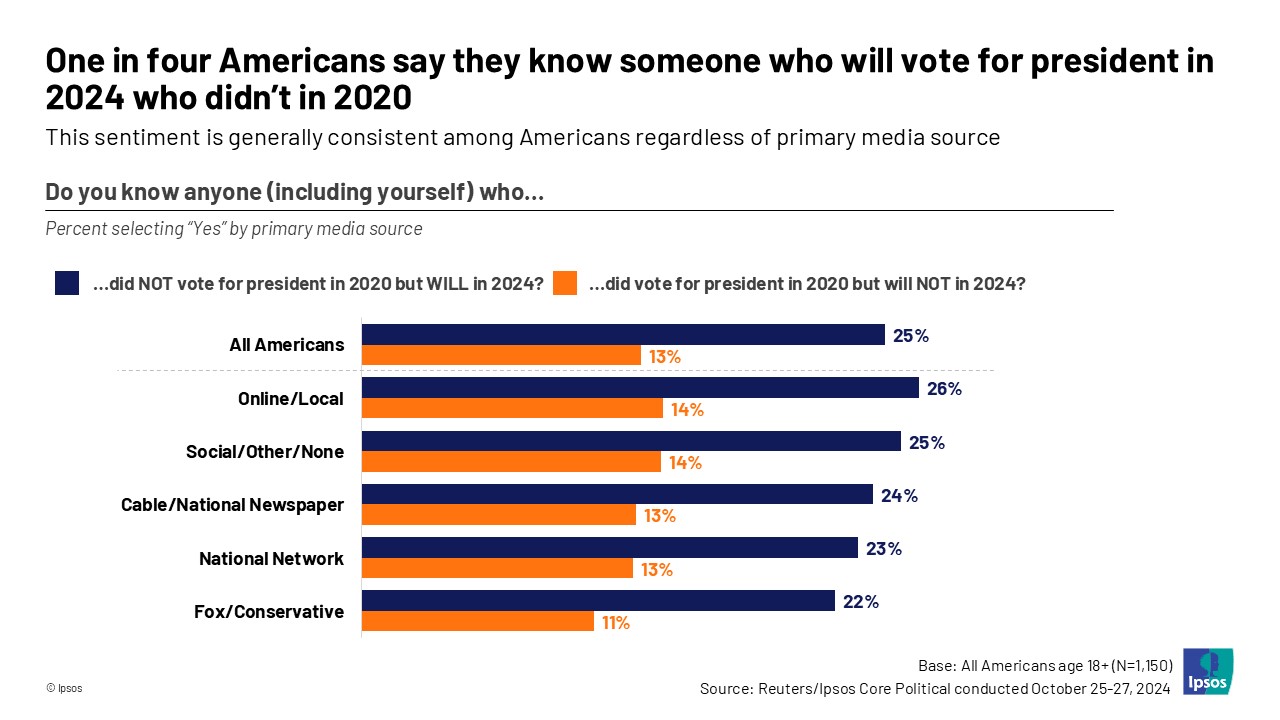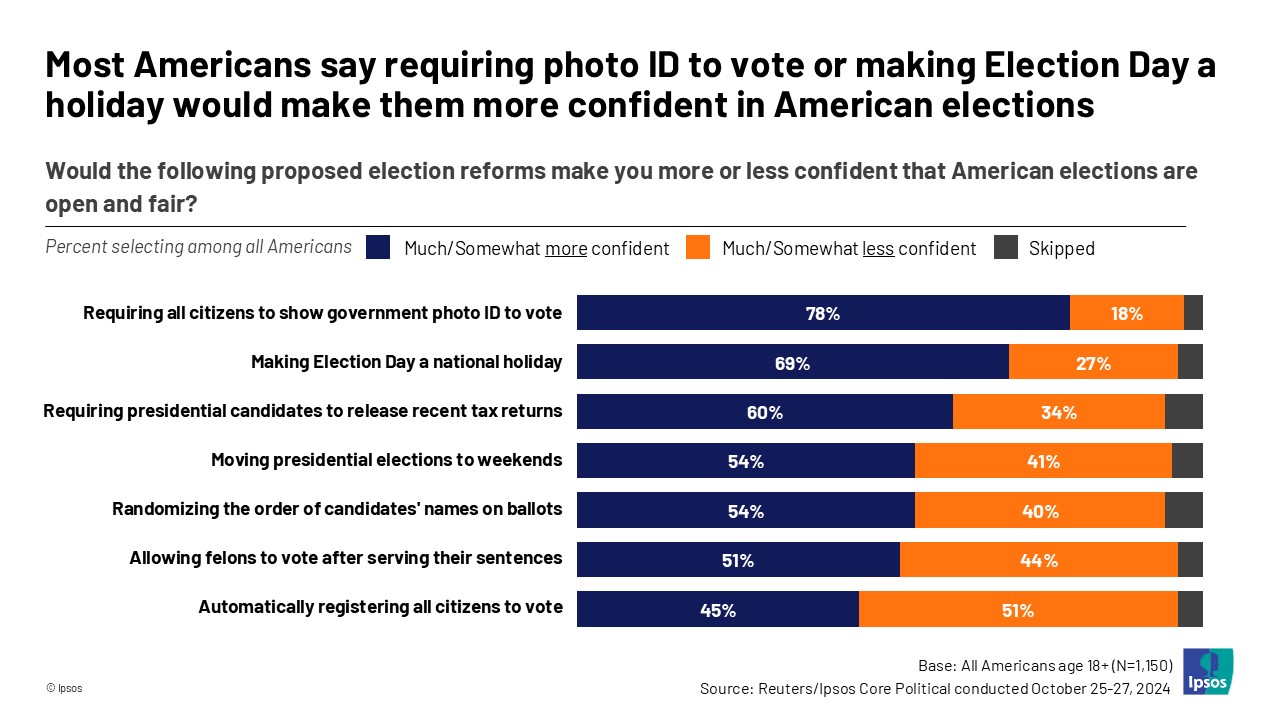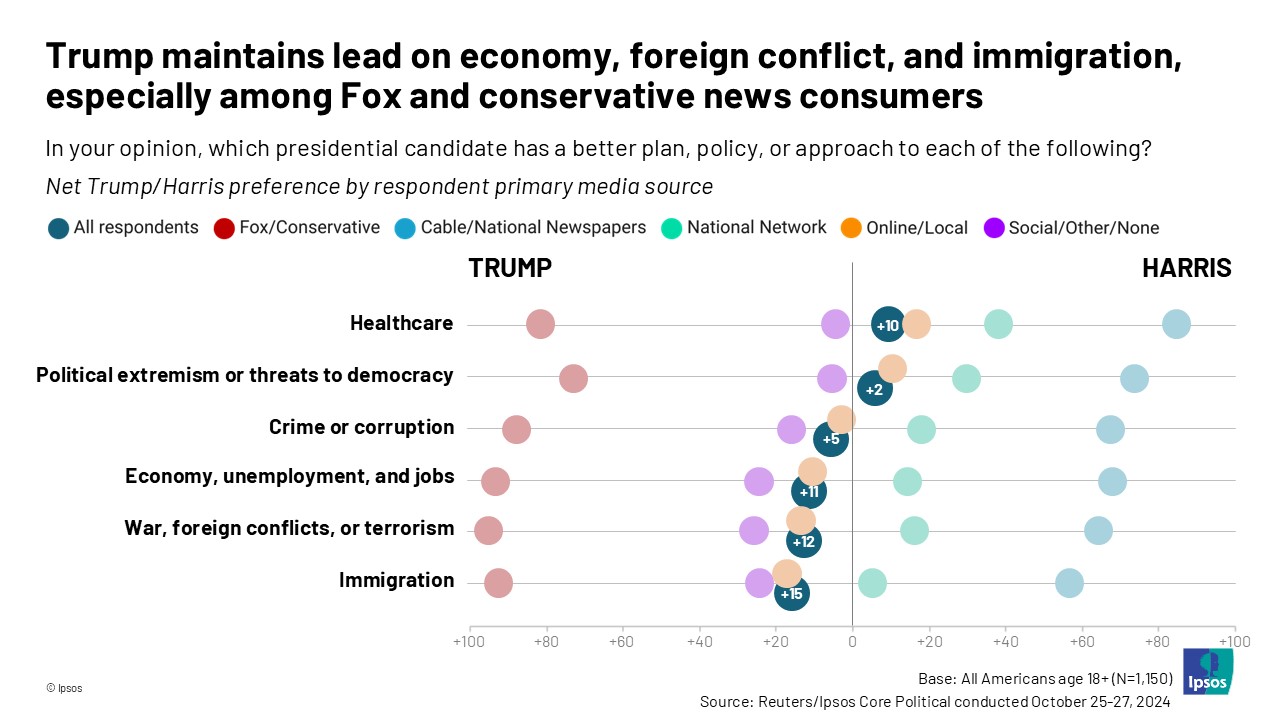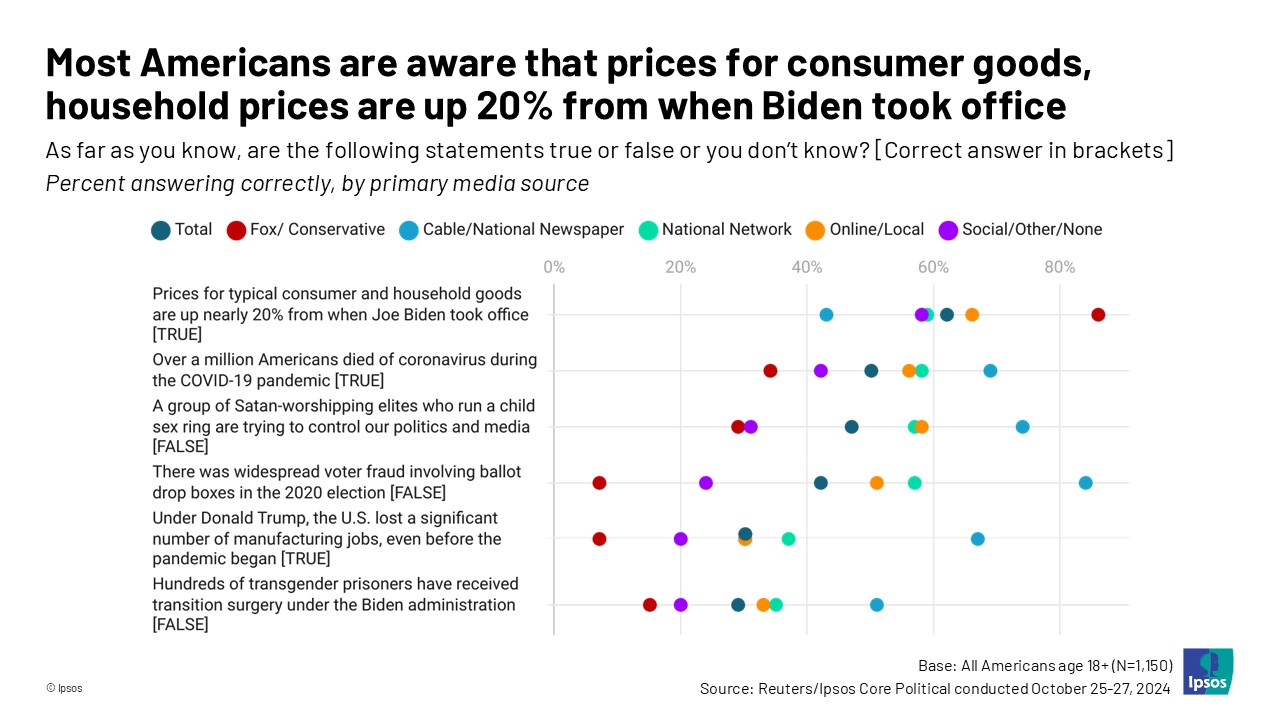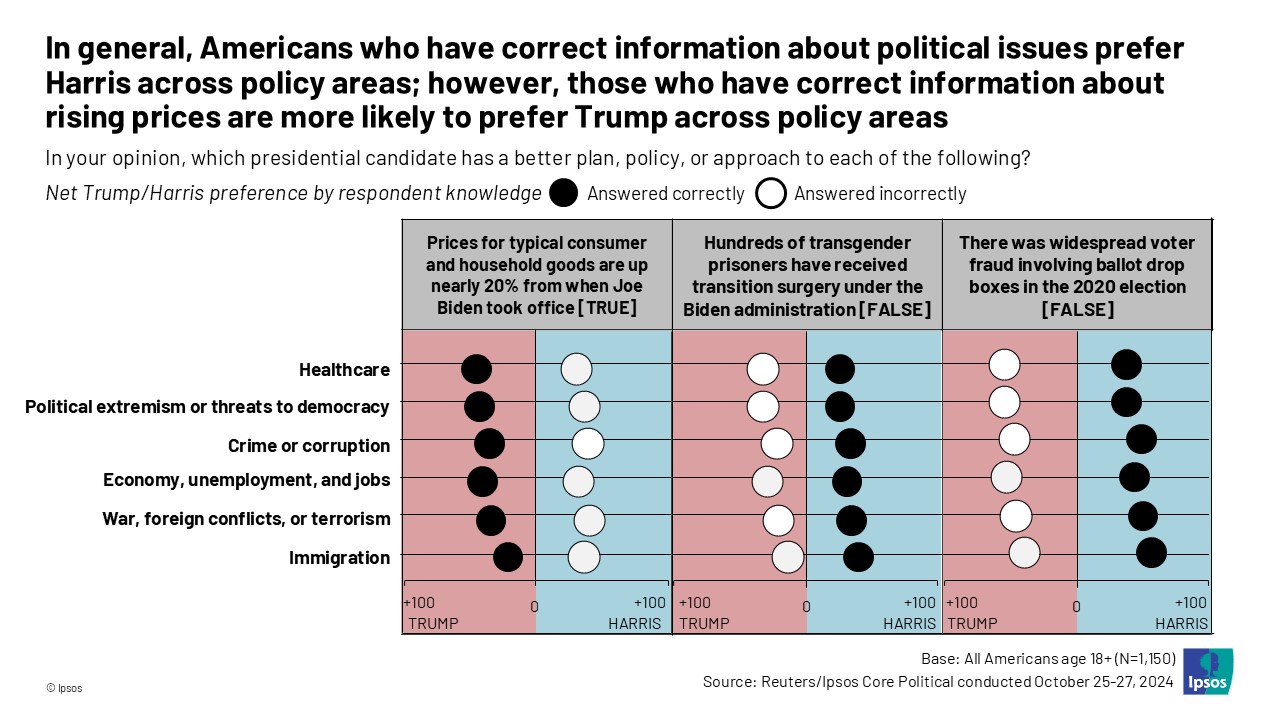October 30, 2024 - Washington, D.C. - A new Ipsos poll finds that Americans who primarily consume Fox News and conservative media outlets are less confident than the general public that votes—via paper, electronic systems, mail, or internet—will be cast and counted accurately in this year’s election. When asked about various election reform proposals, the majority of Americans across media sources say that requiring photo ID or making Election Day a national holiday would make them more confident in American elections. But when it comes to automatically registering all citizens to vote, Americans—regardless of where they get their news—are more divided.
Download Poll
In the upcoming 2024 presidential election, Americans are now slightly more likely to predict former President Donald Trump will win the election than Vice President Kamala Harris. Predictions, however, vary significantly by primary media source as Fox or conservative media consumers are most likely to say Trump will win and as cable/national newspaper consumers are most likely to say Harris will win. Consistent with Ipsos polling from mid-October, primary news sources continue to divide Americans when it comes to preferring Trump or Harris across a variety of issues. Americans also continue to be more likely to have correct information about political issues in general if they primarily consume cable/national newspapers. Notably, though, Americans who primarily consume Fox News/Conservative media are most likely to correctly identify that prices of typical consumer and household goods have increased since Biden took office.
Detailed Findings
1. Slightly more Americans predict Trump will win than Harris in 2024. However, predictions on who will win vary significantly by primary news source.
- Regardless of the candidate they support, 37% of Americans predict Trump will win and 33% predict Harris will win. About three in ten (28%) say they don’t know.
- Americans who primarily consume Fox or Conservative media are the most likely of primary media consumers to say they believe Trump will win the election (78% Trump vs. 8% Harris).
- In contrast, Americans who primarily consume cable/national newspapers are most likely of various primary media consumption groups to say they believe Harris will win the election (60% vs. 12% Trump).
- Americans who primarily consume online or local news are most aligned with general public opinion about who will win the presidential election: 36% say Trump and 32% say Harris.
2. More Americans say they know of someone, including themselves, who didn’t vote for president in 2020 but who will vote in 2024 compared to someone who voted in 2020 but isn’t planning to vote in 2024.
- One in four (25%) Americans say they know someone (including themselves) who didn’t vote for president in 2020 but is planning to vote in 2024.
- In comparison, just 13% say they know someone (including themselves) who voted for president in 2020 but aren’t planning to vote in 2024 (13%). Americans who are not likely voters (20%) are more likely than likely voters (10%) to say they know someone who fits this description.
- Americans are similarly likely to say they know someone who did not vote in 2020 but will vote in 2024—as well as someone who did vote in 2020 but won’t vote in 2024—regardless of their primarily consumed media source.
3. Most Americans are confident that votes cast via paper ballots, electronic voting systems, or mail-in ballots will be accurate cast and counted. The majority also say requiring photo ID to vote or making Election Day a national holiday would make them more confident in American elections. These sentiments, however, vary by primary media consumption.
- About three-quarters (73%) of Americans say they are confident that votes cast via paper ballots will be accurately cast and counted in this year’s election. Sixty-eight percent say the same about electronic voting systems, and 59% say so about mail-in ballots. Just 36% of Americans say they are confident that votes cast over the internet will be accurately cast and counted.
- Americans who primarily consume Fox/Conservative media are generally less confident in the accuracy of various voting methods than other media consumers. Meanwhile, Americans who primarily consume cable or national newspapers are generally more confident in the accuracy of various voting methods than the general public.
- Nearly four in five (78%) Americans say that requiring all citizens to show government photo ID to vote would make them more confident that American elections are open and fair. Majorities say the same about making Election Day a national holiday (69%), requiring presidential candidates to release recent tax returns in order to appear on the ballot (60%), moving presidential elections to weekends (54%), and randomizing the order of candidates’ names on ballots (54%).
- Americans are more split about automatically registering all citizens to vote: A bare majority (51%) it would make them less confident in American elections, but 45% say it would make them more confident.
- Majorities of Americans across primary media source say that requiring photo ID or making Election Day a national holiday would make them more confident in American elections. Yet, Americans who primarily consume Fox News/Conservative media are more likely than the general public to say requiring photo ID would make them more confident (95% vs. 78%).
- Perspectives of automatically registering all American citizens to vote vary by primary media source. Majorities of cable/national newspaper consumers and national network consumers say it would make them more confident in American elections (63% and 52%). However, just one in five (20%) Fox News/conservative media consumers say the same. Just under half of online/local news consumers and social media or other media consumers say automatic voter registration would make them more confident (47% and 45%, respectively).
4. Primary news sources divide Americans when it comes to preferring Trump or Harris on the issues.
- Americans who consume Fox News/Conservative media are more likely to prefer Trump on every issue asked about, especially on the economy, war, and immigration.
- On the other hand, consumers of Cable News/National Newspapers are more likely to view Harris as better on every issue asked about, particularly on healthcare, political extremism, and the economy.
- Overall, Americans who primarily consume online or local news are most aligned with Americans’ preferences overall on whether Trump or Harris is better on each issue. In particular, online and local news consumers prefer Harris on healthcare and prefer Trump on immigration, war, and the economy.
5. Americans who get their news from various sources have differing understandings of several issues, including the economy, elections, and governance.
- Fox News/Conservative media viewers (41%) are more likely to incorrectly say that hundreds of transgender prisoners have received transition surgery under the Biden administration compared to Americans overall (17%).
- Fox News/Conservative media viewers (24%) are more likely than Americans overall (13%) to incorrectly state that a group of Satan-worshipping elites who run a child sex ring is trying to control our politics and media.
- On the other hand, Americans who primarily consume Fox News/Conservative media (86%) are more likely than Americans overall (62%) to correctly answer that prices for consumer and household goods are up nearly 20% from when Joe Biden took office. Consumers of Cable News/National Newspapers (43%) are the least likely to answer this question correctly.
6. In general, Americans who have correct information about political issues prefer Harris across policy areas. However, those who have correct information about rising prices are more likely to prefer Trump across policy areas.
- Across nearly all questions asked, Americans who have correct information about political issues are more likely to prefer Harris’ approaches to the economy, threats to democracy, immigration, healthcare, crime or corruption, and war.
- However, when asked about rising prices since President Joe Biden took office, Americans who answer correctly are more likely to say they prefer Trump’s approach when it comes to the economy, threats to democracy, immigration, healthcare, crime or corruption, and war.
About the Study
This Ipsos poll was conducted October 25-27, 2024 by Ipsos using the probability-based KnowledgePanel®. This poll is based on a nationally representative probability sample of 1,150 general population adults aged 18 or older.
The margin of sampling error for this study is plus or minus 3.1 percentage points at the 95% confidence level, for results based on the entire sample of adults. The margin of sampling error takes into account the design effect, which was 1.13. The margin of sampling error is higher and varies for results based on other sub-samples. In our reporting of the findings, percentage points are rounded off to the nearest whole number. As a result, percentages in a given table column may total slightly higher or lower than 100%. In questions that permit multiple responses, columns may total substantially more than 100%, depending on the number of different responses offered by each respondent.
The survey was conducted using KnowledgePanel®, the largest and most well-established online probability-based panel that is representative of the adult U.S. population. Our recruitment process employs a scientifically developed addressed-based sampling methodology using the latest Delivery Sequence File of the USPS – a database with full coverage of all delivery points in the US. Households invited to join the panel are randomly selected from all available households in the U.S. Persons in the sampled households are invited to join and participate in the panel. Those selected who do not already have internet access are provided a tablet and internet connection at no cost to the panel member. Those who join the panel and who are selected to participate in a survey are sent a unique password-protected log-in used to complete surveys online. As a result of our recruitment and sampling methodologies, samples from KnowledgePanel® cover all households regardless of their phone or internet status and findings can be reported with a margin of sampling error and projected to the general population.
The data were weighted to adjust for gender by age, race/ethnicity, education, Census region, metropolitan status, household income, and party ID. Party ID benchmarks are from the 2024 NPORS annual survey. The demographic benchmarks came from the 2023 March supplement of the U.S. Census Bureau’s Current Population Survey (CPS).
- Gender (Male, Female) by Age (18–29, 30–44, 45-59 and 60+)
- Race/Hispanic Ethnicity (White Non-Hispanic, Black Non-Hispanic, Other, Non-Hispanic, Hispanic, 2+ Races, Non-Hispanic)
- Education (Less than High School, High School, Some College, Bachelor degree, Master’s degree or above)
- Census Region (Northeast, Midwest, South, West)
- Metropolitan status (Metro, non-Metro)
- Household Income (Under $25,000, $25,000-$49,999, $50,000-$74,999, $75,000-$99,999, $100,000-$149,999, $150,000+)
- Party ID (Democrat, Lean Democrat, Republican, Lean Republican, Independent/Something else)
This topline is trended with a previous Core Political study conducted October 11-13, 2024 by Ipsos using the probability-based KnowledgePanel®. This mid-October Ipsos Core Political poll is based on a nationally representative probability sample of 938 general population adults aged 18 or older. The margin of sampling error for this study is plus or minus 3.5 percentage points at the 95% confidence level, for results based on the entire sample of adults. The margin of sampling error takes into account the design effect, which was 1.27.
About Ipsos
Ipsos is one of the largest market research and polling companies globally, operating in 90 markets and employing over 18,000 people.
Our passionately curious research professionals, analysts and scientists have built unique multi-specialist capabilities that provide true understanding and powerful insights into the actions, opinions and motivations of citizens, consumers, patients, customers or employees. Our 75 solutions are based on primary data from our surveys, social media monitoring, and qualitative or observational techniques.
Our tagline "Game Changers" sums up our ambition to help our 5,000 customers move confidently through a rapidly changing world.
Founded in France in 1975, Ipsos has been listed on the Euronext Paris since July 1, 1999. The company is part of the SBF 120 and Mid-60 indices and is eligible for the Deferred Settlement Service (SRD). ISIN code FR0000073298, Reuters ISOS.PA, Bloomberg IPS:FP www.ipsos.com
Source: Ipsos







